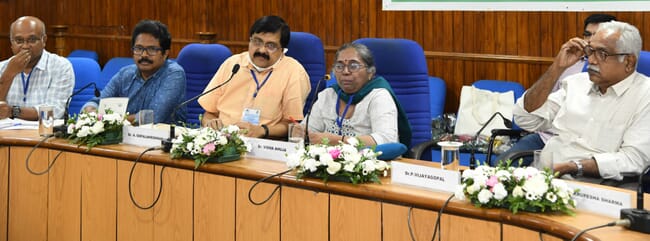Speaking at an awareness workshop on the use of genetically modified (GM) crops and their derivatives for the aqua-feed sector – organised by the Biotech Consortium India Limited (BCIL) in association with ICAR-Central Marine Fisheries Research Institute (CMFRI) – the experts highlighted that GM crop-based products (mainly non-living genetically modified organisms) have huge scope in enhancing the supply of feed ingredients, thereby promoting growth, disease resistance and reduction of input costs in aquaculture production.
The fisheries and biotechnology experts also emphasised that the introduction of GM crops in the aqua-feed sector would help reduce the mounting pressure on fishmeal and fish oil and maintain a sustainable aquaculture industry.
Dr Vibha Ahuja, chief general manager of BCIL, said at the workshop that GM crops come with several desirable traits, such as insect resistance, disease resistance and herbicide tolerance, and using them would be beneficial to boost the yield. She continued by explaining that cost analysis showed that the use of dried distillers grains with soluble (DDGS) – a by-product from cereals in the distillery industry – can help reduce shrimp feed prices. However, she added, most of the DDGS produced globally are of GM-corn origin and Indian feed producers could capitalise on the economic benefits if they were open to using them as feed ingredients.

Dr Ahuja promoted the benefits of using GM crops in feed ingredients and argued that approved GM crops are as safe as non-GM crops © CMFRI
Diminishing various concerns over GM crops, Dr Ahuja pointed out that in the last 25 years there had been no confirmed report of adverse effects reported from approved GM crops. “Systemic regulations are in place to ensure the safe use of GM crops which are monitored by internationally accepted safety assessment methodologies. Hence, an approved GM crop is as safe as that of its non-GM counterpart,” she added.
In India, the GM crop Bt cotton has been cultivated since 2002 with significant increase in production and equal economic benefits for the farmers. In October 2022, the government of India approved the environmental release of GM mustard for its seed production and testing as per the existing ICAR guidelines. Dr Ahuja believes there is a need for extensive research and field testing and streamlining the approval procedures for cultivation, import and use in India.
One of the primary benefits of GM crops in the aqua sector is their ability to increase the nutritional value of the feed. As Dr A Gopalakrishnan, director of CMFRI, explained in a press release: “GM soybeans can be engineered to produce omega-3 fatty acids, which are important for the growth and health of farmed fish.” He added that feed constitutes 50-55% of total input cost in aquaculture, therefore it is essential to develop streamlined regulatory efforts with careful considerations for the ethics and risks associated with using GM plant ingredients in aquafeeds.
The workshop offered an opportunity for open discussion among scientists working on fish nutrition, genetics, microbiology and molecular biology. It also identified potential multi-disciplinary researchable issues, such as biosafety risk assessment of GM feed ingredients in shrimp and fish, environmental issues arising from excess fish feed containing non-living GM ingredients, and the development of customised feed products with the desired nutrient value.


